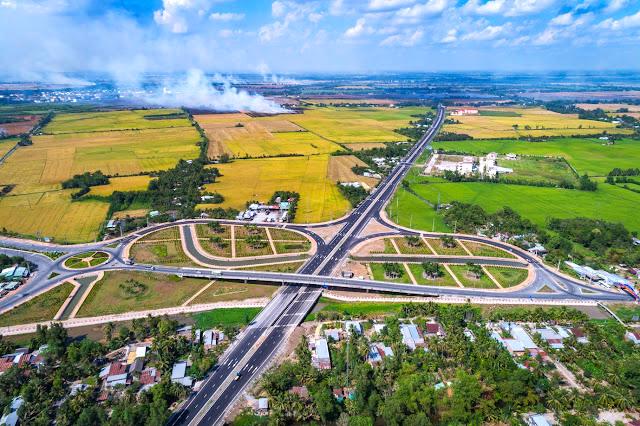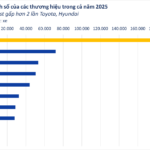At a symposium, Dr. Nguyen Van Dinh, Chairman of the Vietnam Real Estate Brokers Association, shared that recently, the Vietnamese National Assembly passed three important laws: the Land Law (amendment), the Real Estate Business Law (amendment), and the Housing Law (amendment), which have significant implications for the development of the real estate market. The stringent provisions of these laws will contribute to supporting real estate enterprise development. Importantly, they will create transparency, fairness, and opportunities for genuine investors and capable developers.
Explaining the recent surge of foreign real estate investors seeking opportunities in the Vietnamese market, Dr. Dinh believes that Vietnam is a country with a huge potential. It is the only country in Southeast Asia with a big supply-demand gap, which is why foreign investors are turning to real estate investments here.
In the real estate market of the Mekong Delta region, the President of the Vietnam Association of Realtors (VARS) evaluates the region as having great potential due to its favorable natural conditions and climate. This area not only maximizes its agricultural growth capacity and seafood export strength but also attracts a strong influx of FDI in the industrial sector, clean energy, logistics, and more.
Furthermore, the provinces and cities in the region are becoming a driving force for enhancing the internal and external trading connection between the Mekong Delta and Ho Chi Minh City, the Southeast, and the whole country. This is an opportunity for the region to improve the living standards of the people and for investors to develop real estate projects in the Mekong Delta to meet the housing needs of the local population.
Potential arising from infrastructure investment
According to this, the real estate market in the Mekong Delta is becoming an attractive destination for investors, both domestic and foreign, as positive information about transportation infrastructure is being actively implemented.

During the period 2023-2025, the Mekong Delta has started construction on several horizontal expressways, such as An Giang – Can Tho – Hau Giang – Soc Trang, and Caolanh – An Huu, with a total length of over 215km and a total investment of over VND 51,000 billion. In particular, the Trung Luong – My Thuan – Can Tho expressway has been put into operation, and the Vinh Thanh industrial park project has provided significant momentum for the real estate market in the area.
Using the example of Quang Ninh, Dr. Nguyen Van Dinh illustrates the potential for real estate development tied to infrastructure investment, where Quang Ninh was a small province with underdeveloped infrastructure and an underdeveloped economy 10 years ago. However, due to the improvement of the transportation system, many real estate investors have been attracted to the area. Major names such as Geleximco, Vingroup, Sungroup, and BIM have invested in large-scale projects there.
“I mention this to illustrate that in reality, the Mekong Delta also has significant potential. Besides, the real estate prices in the region are currently very low, and there are many hidden “eagles” (promising projects) waiting to be discovered. When infrastructure investment and transportation systems are greatly enhanced, they will boost the existing factors for regional development,” emphasized Dr. Dinh.
Also at the symposium, sharing an assessment of real estate prices in the Mekong Delta region, Mr. Pham Van Luan, Permanent Vice Chairman of the Can Tho Real Estate Association, stated that this year, primary selling prices will increase, while secondary selling prices will remain stable and are forecasted to increase slightly. The high-end apartment segment will become a new trend for residence and investment, receiving positive responses from the market. Meanwhile, land plots will see a strong price increase due to the regulation banning the subdivision of plots in special-type urban areas coming into effect on January 1, 2025.
According to Mr. Luan, with the simultaneous validity of three real estate-related laws, including the Land Law (amendment), the Housing Law (amendment), and the Real Estate Business Law (amendment) from January 1, 2025, it is worth noting that special-type urban areas I, II, III will no longer be allowed to divide and sell plots, giving an advantage to land projects currently being developed in 2024. Starting from January 1, 2025, land plots will continue to become scarce, making way for completed housing projects and apartments.
In Can Tho city, the central urban area of the Mekong Delta, the main supply will be apartment segments, including social housing and high-end apartments, in the city’s central area; whereas in the suburban districts, land plots will continue to dominate the market.
Regarding customer demands, Mr. Luan evaluated that local customers’ trust in the real estate market is increasing thanks to the resolute management policies of the Government, the acceleration of public investment, the completion of critical transportation projects, and the deployment of numerous major commercial and entertainment projects. These factors attract more customers and investors from other regions to buy and invest in the Mekong Delta.
In addition, high-quality products, developed by reputable investors, that meet actual needs, have attractive prices, and offer good policies will attract a large number of customers. Customers are also shifting their attention to the high-end apartment segment in central areas of major cities like Can Tho for convenience and to meet their living needs.
Furthermore, it is projected that the real estate market in the Mekong Delta in 2024 will also attract remittances, as well as additional bank funds from maturing deposits due to decreasing interest rates.












